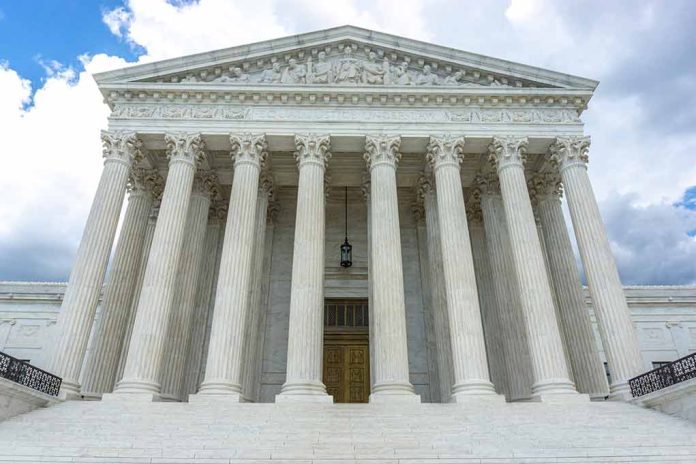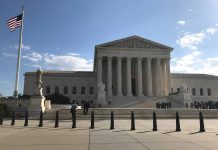
Georgia’s Supreme Court reinstates the Heartbeat Law, protecting unborn lives and sparking nationwide debate.
At a Glance
- Georgia Supreme Court temporarily reinstates near-ban on abortions after 6 weeks
- Decision halts lower court ruling that had struck down the Heartbeat Law
- Republican Attorney General Chris Carr requested the stay
- Pro-life groups applaud decision, while liberal activists express disappointment
- Georgia joins 13 other states with strict abortion bans
Supreme Court Intervenes to Protect the Unborn
In a significant victory for the pro-life movement, the Georgia Supreme Court has temporarily reinstated the state’s Heartbeat Law, effectively halting a lower court’s ruling that had struck down the near-ban on abortions. This decisive action demonstrates the court’s commitment to protecting the most vulnerable members of society and upholds the will of Georgia’s citizens as expressed through their elected representatives.
The Heartbeat Law, signed in 2019, bans most abortions after a “detectable human heartbeat,” which typically occurs around six weeks into pregnancy. This legislation reflects the growing movement across America to safeguard innocent lives, aligning Georgia with 13 other states that have implemented total abortion bans.
A judge’s ruling striking down Georgia’s abortion ban was stayed on Oct. 7 by the Georgia Supreme Court. https://t.co/SXlEha8Lep
— NTD News (@NTDNews) October 7, 2024
Legal Battle and Political Implications
The temporary reinstatement of the Heartbeat Law came at the request of Republican Attorney General Chris Carr, showcasing the commitment of Georgia’s conservative leadership to defending life. This move effectively pauses the ruling by Fulton County Superior Court Judge Robert McBurney, who had found that Georgia’s abortion restrictions violated privacy rights under the state constitution.
While Justice John J. Ellington dissented, arguing against enforcing laws that violate fundamental rights, the majority of the Supreme Court recognized the importance of protecting the unborn while the appeal is considered. This decision ensures that Georgia remains at the forefront of the pro-life movement, standing firm in the face of liberal opposition.
BREAKING: The Georgia Supreme Court reinstated the heartbeat bill, protecting unborn children as early as six weeks from abortion. pic.twitter.com/1At5L1BK1J
— CatholicVote (@CatholicVote) October 8, 2024
Reactions and Implications
Pro-life organizations, such as the Georgia Life Alliance, have applauded the Supreme Court’s decision. Their support stems from concerns over a potential influx of out-of-state abortions, which could have undermined Georgia’s efforts to protect unborn lives. On the other hand, liberal groups like the SisterSong Women of Color Reproductive Justice Collective have criticized the move, claiming it denies necessary care to Georgians.
The Heartbeat Law includes penalties for providers but not for women seeking abortions, striking a balance between deterring the practice and avoiding criminalization of women in difficult situations. This approach reflects a compassionate yet firm stance on the issue of abortion.
National Context and Future Implications
Georgia’s reinstatement of the Heartbeat Law is part of a broader national trend. Thirteen U.S. states now have total abortion bans, with four others implementing bans around six weeks of pregnancy. This growing movement demonstrates a shift in American values towards protecting life from its earliest stages.
As the legal battle continues, the Georgia Supreme Court’s decision serves as a beacon of hope for those who believe in the sanctity of life. It reinforces the importance of state-level action in shaping abortion policy and protecting the rights of the unborn, even as the debate continues at the national level.
In conclusion, the temporary reinstatement of Georgia’s Heartbeat Law represents a significant victory for the pro-life movement and a step towards ensuring that every unborn child is given the chance at life. As the legal process unfolds, supporters of life remain hopeful that this decision will be upheld, cementing Georgia’s position as a leader in protecting the most vulnerable among us.
Sources:
- Georgia Supreme Court reinstates 6-week abortion ban as it considers appeal
- Georgia Supreme Court Reinstates Six-Week Abortion Ban
- Georgia Supreme Court restores near-ban on abortions while state appeals
- A narrative analysis of anti-abortion testimony and legislative debate related to Georgia’s fetal “heartbeat” abortion ban
- A narrative analysis of anti-abortion testimony and legislative debate related to Georgia’s fetal “heartbeat” abortion ban









